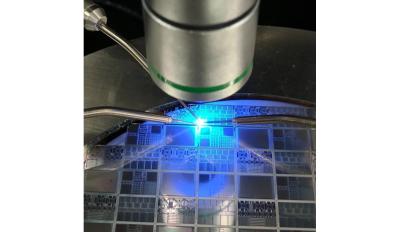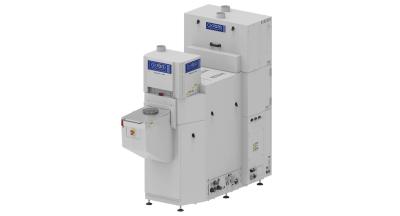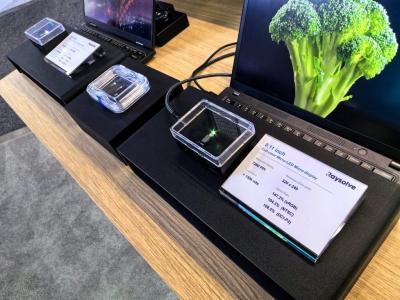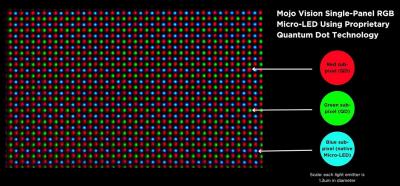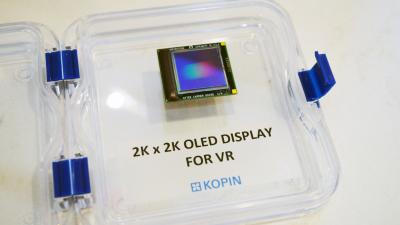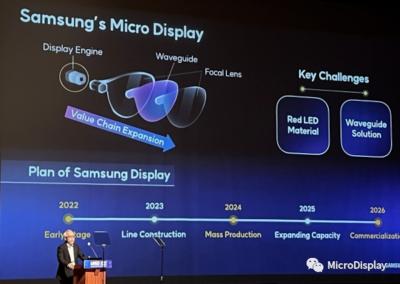STRATACACHE to integrate Lumiode's backplane deposition technology in its microLED fab in Eugene, Oregon
US-based signage leader STRATACACHE announced that it has signed a strategic research and IP licensing agreement with US-based Lumiode that will enable STRATACACHE to integrate Lumiode's technology in its upcoming E4 microLED production line in Eugene, Oregon.
Lumiode's technology enables the deposition of an active matrix backplane directly on the LED structure. Lumiode's technology enables the production of both large-area displays and small microdisplays, and it is likely that STRATACACHE is interested in the former.
Porotech signs up PSMC to commercialize its microLED displays
Porotech announced a strategic partnership with Taiwan’s Powerchip Semiconductor Manufacturing Corp. (PSMC), to bring Porotech's microLED displays top market.
The two companies did not disclose much, but Porotech says that this collaboration is an important step forward toward mass production of its microLED microdisplays.
Oxford Instruments installs its 200 mm ALD passivation tool at a UK-based microLED microdisplay developer
UK-based Oxford Instruments Plasma Technology announced that it has installed one of its 200 mm atomic layer deposition (ALD) passivation systems at a UK microLED provider, in order to support the customer's latest AR microdisplay development and production. The OIPT system is used to deposit high-K dielectric ultra-thin films for high-density, very high-brightness, low-power and high frame-rate RGB pixel arrays.
OIPT says that its low-damage plasma ALD technology is optimized for smaller dies with smaller active areas, and was shown in some cases by its customers at ICNS to double external quantum efficiency.
Saphlux Unveils T2 Series Monolithic Full-Color Micro-Display with Enhanced Brightness and Color Performance
In a recent announcement, Saphlux, Inc. revealed that its NPQD® Monolithic Full-Color Micro- LED (mLED) technology has successfully undergone a new round of technological upgrades. Following this advancement, the company has launched the enhanced T2 series micro-displays.
The Saphlux T series micro-displays incorporate core technologies, including NPQD® and large-scale silicon-based bonding, specifically tailored for the AR display applications. The series currently encompasses 0.12-inch monochrome single-color (red, green, blue) micro-displays and 0.39-inch monolithic full-color micro-displays.
Raysolve shows new microLED microdisplay prototypes at CES 2024
Hong Kong based microLED microdisplay developer Raysolve Technology demonstrated two new microLED microdisplay prototypes, 0.11" (320x240) and 0.22" full color displays. The displays feature a density of 7,200 PPI and a brightness of up to 150,000 nits (full color).
The displays are based on blue LEDs, with the company's proprietary Quantum dot photoresist (QDPR) process. Raysolve says it has optimized its QD process and increase the color gamut of its displays - which now achieve 147.2% sRGB, 104.3% NTSC and 108.5% DCI-P3.
Vuereal shows its latest microLED microdisplays at CES 2024
MicroLED display developer VueReal demonstrated its latest microLED display prototypes at CES 2024.
In the video, you can see VueReal's 2um microLED microdisplays. These are monochrome displays, but VueReal says it will showcase its first full-color microdisplays in Displayweek 2024. VueReal's CEO Reza Chazi explains the company's approach and solutions.
Mojo Vision developed a full-color microLED microdisplay prototype
MicroLED microdisplay developer Mojo Vision announced that it has integrated red, green and blue sub-pixels into a single panel, thus producing its first full-color microdisplay.
Mojo Vision's prototype is based on the company's own high-performance QD materials, and integration process. The prototype display is based on 1.3 um blue LEDs.
Kopin and MICLEDI to co-develop microLED microdisplays
Kopin announced a strategic agreement with MICLEDI to design, develop and produced advanced full-color microLED displays for AR applications.
A 2k OLED microdisplay by Kopin
The project will adopt MICLEDI's CMOS microLED production process, and Kopin's backplane and driving technologies. Kopin will also contribute its deep experience in manufacturing complete display systems.
Rayleigh Vision's CEO gives us the latest updates and his views on the microLED industry, towards his upcoming talk at MicroLED-Connect
Rayleigh Vision was established in 2023 in Hong Kong, to developed stacked microLED microdisplay technologies. The company's technology enables the stacking of LEDs on top of each other, to create high-density displays. The company's founder and CEO, Prof. Jr-Hau HE, will give a talk at the upcoming MicroLED-Connect startup showcase event on February 2024, and was kind enough to answer a few questions we had regarding the company's status, technology, and his views on the microLED industry and market.
Hello Prof. Jr-Hau, Can you tell us a bit your company, and technology, and your next steps?
Rayleigh Vision is a company that specializes in disruptive MicroLED technology, with a focus on solutions for full-color microdisplays. Our team includes pioneers in MicroLED technology, who have over a decade of experience in this field.
Although we've seen significant advancements in MicroLED technology, challenges remain. These include developing a full-color solution for microdisplays, improving mass transfer efficiency, and enhancing process yields. From the perspective of microdisplays, achieving a full-color display with a high Field of View (FOV) and Pixels per Degree (PPD) is crucial for an immersive Extended Reality (XR) experience. However, no product currently on the market meets these specifications.
Samsung Semiconductors to take over Samsung's microLED microdisplay development
According to new reports from Korea, Samsung Electronics decided that from now on, Samsung Display will handle all OLED microdisplay projects, while Samsung Semiconductor (SSI, or specifically, the Compound Semiconductor Solutions team) will handle all microLED microdisplay development.
Samsung sees OLED microdisplays as the solution of choice for next-generation VR headsets, such as Apple's Vision Pro (that uses 1.4" 4K OLED microdisplays made by Sony), while microLEDs will power the more demanding AR applications.
Pagination
- Previous page
- Page 2
- Next page
